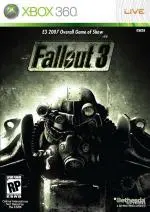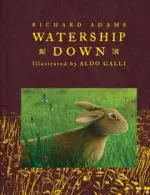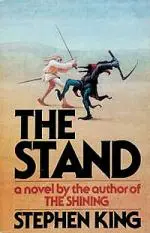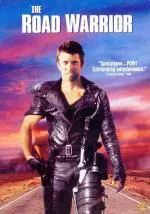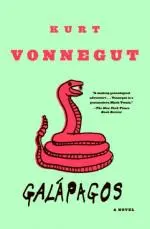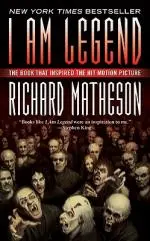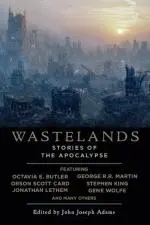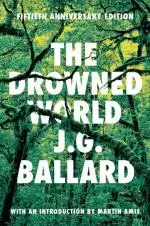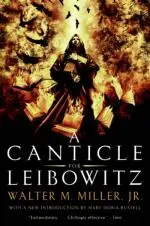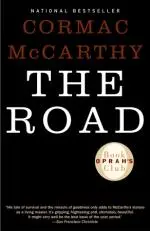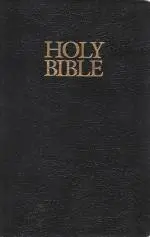This month sees the release of two post-apocalyptic films: the thriller World War Z and the comedy This is the End, proving that audiences still have an appetite for end-of-the-world fare. If anything, its popularity seems to be increasing. Television shows like Revolution, Falling Skies, and Defiance are all recent productions. Games like Fallout and Borderlands continue to sell well. The fact that there’s a mainstream post-apocalyptic comedy in theaters seems to say that this is a genre we’re so familiar with that parody and satire seem to be the logical next steps.
As a fan of post-apocalyptic fiction, I’m happy to see it endure, especially as the flavor I grew up with (the post-nuclear war variety) almost went out of style with the Cold War. But post-apocalyptic fiction to me has never been about the apocalypse, about the collapse of society as we know it. To me it’s always always been about hope. In the midst of terrible things, the dismantling of everything we’ve come to know and depend upon, post-apocalyptic fiction focuses on not only the struggle to survive, but often the attempt to preserve or rebuild the best parts of humanity. It allows us to hold up a mirror to ourselves and see both the heights and depths of what we’re capable of.
Which brings us to my Top 10 List of Post-Apocalyptic Fiction. Keep in mind that this is my Top 10. I expect other people’s to differ. Also, I omitted any zombie fiction from this list, not because I don’t think it qualifies, but because I recently covered it in a separate column and wanted to avoid repeats. As always, I welcome your feedback in the comments.
![]() 10. Fallout
10. Fallout
Sure, it’s a game series, but Fallout helped define the post-apocalyptic world for many people. The first game came out in 1997, so it’s firmly in the post-nuclear wasteland category of post-apocalyptia, which seems to just make it more classic. I’ve played most of the games and what I love about them, in addition to their stories, is the retro-future flavor to the world as well as the humor. The recent Bethesda additions to the series, Fallout 3 and Fallout: New Vegas, immerse you even more fully into the world and let you determine the future of the American wasteland. Some of my favorite games of all time.
![]() 9. Watership Down
9. Watership Down
Some of you may shake your head at this choice, and it’s something I’ve said before, but Watership Down is essentially a post-apocalyptic novel that focuses on rabbits instead of humans. It’s also one of my favorite novels. Hazel’s band of rabbits may seem like little harmless fuzzy creatures, but when their warren is destroyed, they must travel their own road to find a new home while facing impossible dangers, relying on their cultural mythology for guidance, and avoiding the survivors who seek their destruction. Call me crazy, but a lot of The Walking Dead (the comic at least) owes a debt to Watership Down.
![]() 8. The Stand
8. The Stand
Stephen King’s epic post-apocalyptic novel has all of the classic hallmarks of the genre. Pandemic that wipes out most of the population? Check. Scrappy survivors banding together to navigate the post-collapse world? Check. Classic divide between “heroes” and “monsters?” Check. However, King injects a bit of the supernatural or spiritual to his post-apocalypse. The “good” characters are all visited by visions of Mother Abigail. The “evil” characters are called by Randall Flagg, the Man in Black. This leads to a final confrontation between both sides in Las Vegas.
![]() 7. The Road Warrior
7. The Road Warrior
I don’t think I could create a list of post-apocalyptic fiction without The Road Warrior. The images from this movie essentially defined what the post-apocalyptic world was like when I was growing up. Post-nuclear Australia, the costumes, the vehicles, that kid with the razor boomerang. Not to mention Mel Gibson before he was a raving lunatic. We've moved on to other visions of the post-apocalypse, but this one remains a classic.
![]() 6. Galapagos
6. Galapagos
Perhaps an unconventional pick, but Kurt Vonnegut is one of my favorite authors, science fiction or otherwise, and Galapagos is his entry into the post-apocalyptic genre, detailing how the world changes after an economic crisis causes the collapse of modern society. Unlike many post-apocalyptic stories that seem to pin their hopes on human virtues overcoming human flaws, Vonnegut pins all the mistakes and catastrophes of the book on the human brain. The only solution? Make it smaller.
![]() 5. I Am Legend
5. I Am Legend
The subject of a few movie adaptations, Richard Matheson’s I Am Legend remains the authoritative text. While it influenced the zombie apocalypse genre, the monsters in the novel more closely resemble vampires created by a pandemic. Unlike other post-apocalyptic tales where humans must band together and/or survive the survivors, Robert Neville, Matheson’s protagonist, appears to the be the only uninfected human left alive. As others have said, a novel that focuses on the loneliness of being one of the last humans alive.
![]() 4. Wastelands
4. Wastelands
If you like short stories (and you should, they’re awesome) then this is the anthology for you. Editor John Joseph Adams has collected 22 post-apocalyptic stories from authors such as Stephen King, George R. R. Martin, Octavia Butler and Paolo Bacigalupi. Adams is a big post-apocalyptic fan and has put together what might be the definitive collection of the genre.
![]() 3. The Drowned World
3. The Drowned World
This masterpiece by J. G. Ballard, which depicts a future earth where the temperature has increased and the polar ice caps have melted, is all the more chilling because it offers a glimpse at our own future. As the Earth returns to something resembling an ancient era, so too do humans seem to be regressing, having strange dreams of primeval swamps. Not the typical landscape of the post-apocalypse, but perhaps more disturbing because of it.
![]() 2. A Canticle for Leibowitz
2. A Canticle for Leibowitz
What sets A Canticle for Leibowitz apart is its focus, and its humor. It centers on a tenuous Christian order in a post-apocalyptic America where books have been burned and science has been purged. If post-apocalyptic fiction mirrors back the strengths and flaws of our own society then this is something of a warning, drawing inspiration from the Dark Ages. But where some stories focus on the world and the struggle, A Canticle for Leibowitz keeps humanity firmly in view, focusing on learning and society, religion and politics in this future world that aims to tell us something about ourselves.
![]() 1. The Road
1. The Road
When Cormac McCarthy pens a post-apocalyptic novel, you just have to pay attention. The Road is a beautifully written novel, evocative and touching and heartbreaking. McCarthy makes you feel the bleakness of the world’s ruin. His words stretch out the land around the titular road while never losing sight of the two main characters. It’s essentially the story of a father and son, and what that means in the post-apocalypse, but the world itself colors every part of the story. Highly recommended.
![]() Honorable Mention: The Bible
Honorable Mention: The Bible
Let’s face it, the Bible practically invented the idea of the apocalypse (though end of the world scenarios have been around for millennia—Ragnarok, the Kali Yuga, etc.). The word “apocalypse” itself comes from the Greek word for “uncovering” or “revelation” and its modern meaning comes from its association to the Christian Book of Revelation. Aside from being another end times scenario, the Book of Revelation gives us such great apocalyptic fare as The Four Horseman and the Seven Seals, and this line: “And I looked, and behold a pale horse: and his name that sat on him was Death, and Hell followed with him.” - Revelation 6:8
That's my list! What do you think? What would you subtract? What would you add? Let me know in the comments.

About the author
Rajan Khanna is a fiction writer, blogger, reviewer and narrator. His first novel, Falling Sky, a post-apocalyptic adventure with airships, is due to be released in October 2014. His short fiction has appeared in Lightspeed Magazine, Beneath Ceaseless Skies, and several anthologies. His articles and reviews have appeared at Tor.com and LitReactor.com and his podcast narrations can be heard at Podcastle, Escape Pod, PseudoPod, Beneath Ceaseless Skies and Lightspeed Magazine. Rajan lives in New York where he's a member of the Altered Fluid writing group. His personal website is www.rajankhanna.com and he tweets, @rajanyk.
